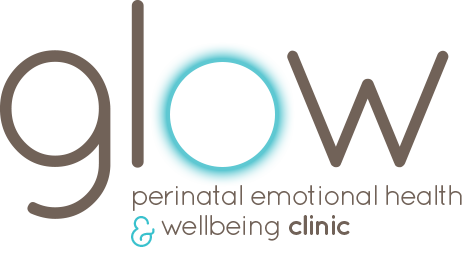What does perinatal mean?
There are many definitions of perinatal. At GLOW, we define the perinatal period as starting from the moment you begin planning to become pregnant, through to when your child reaches kindergarten age.
Am I at risk of psychological difficulties?
This is a question many mothers of new babies ask. A number of factors have been shown to increase the risk of psychological difficulties during, and after, pregnancy, including:
- past history of:
- psychological illness at any time, such as depression, anxiety, eating disorders, bipolar disorder, personality disorders or psychosis
- psychological illness during or after pregnancy, such as antenatal or postnatal depression or anxiety and postnatal psychosis
- significant childhood trauma.
- family history of psychological illness
- recent major life event, such as major illness; or a significant loss such as pregnancy loss or loss of a parent, partner, child or other close relative or friend
- stressful or adverse life events such as changes to, or loss of, work; renovating; moving house; relocating interstate or overseas
- lack of practical, financial, social and / or emotional supports
- relationship difficulties
- perfectionistic personality style
- assisted reproduction and IVF
- intimate partner violence.
Women who are at particularly high risk include those with a past, pregnancy or family history of moderate-severe depression or anxiety, bipolar disorder, eating disorders and psychotic illnesses.
If you feel you may be at risk, we encourage you to book an appointment for a GLOW assessment and management plan.
Do I have Postnatal Depression (PND) or another psychological illness?
PND is common after birth, affecting up to 14.5% of women in the first 3 months [5]. Without effective treatment, PND can persist for months, and sometimes, years. Other psychological illnesses such as Anxiety and Bipolar Disorders can also occur after birth. All psychological illnesses carry risks for the mother, their infant and fathers or partners; and in turn, our community.
Negotiating having a new baby can cause many different emotional responses. You may experience tiredness, or feel overwhelmed, or uncertain. You may find it difficult to know if these are normal experiences or part of a more significant problem, such as postnatal depression or anxiety.
- feeling:
- numb, or in a low mood
- inadequate, like a failure
- sad, empty, hopeless, worthless
- unmotivated
- unable to cope with daily routine
- a loss of interest in normally enjoyable activities
- having difficulty sleeping, or excessive sleeping
- loss of appetite, or over eating
- excessive crying
- thoughts of self-harm or suicide.
- anxiety, fear or worry that is difficult to control
- excessive worry about your baby’s health, or the birth
- feeling irritable, tense, restless, on edge
- experiencing difficulty relaxing and falling asleep at night
- muscle tension
- chest tightness, heart palpitations or shortness of breath
- fear or worry that stops you going out<
- excessive checking on baby.
In many cases, a mixture of depressive and anxiety symptoms can be experienced.
There are a number of very good resources available that provide reliable, good quality information about psychological disorders during, and after, pregnancy. These are listed in the Other Helpful Resources section below.
What are the risks to my baby if I’m breastfeeding, while I’m taking medication?
All psychotropic medications used for significant psychological illnesses are excreted into breast milk.
Most modern antidepressants' breast milk levels have been deemed safe for healthy, term infants. Other medications such as antipsychotics, mood stabilisers and lithium have different profiles.
The management of psychotropic medications in pregnancy, the postpartum period and during breastfeeding requires specialist expertise. We recommend a consultation with your GLOW Psychiatrist. Together, you will review your illness history and current difficulties. You will explore options such as:
- the risks and benefits to you, and your breastfeeding baby, of ceasing, reducing or changing your medication in a safe and supervised manner;
- psychological therapy which may enable reduction or cessation of your medication; and,
- GLOW wellness services such as nutrition, yoga, pilates or massage.
If you feel you may be at risk, contact us and book an appointment for a GLOW assessment and management plan.
Other resources available to help you make decisions when caring for your newborn baby
Below is a list of organisations who can provide additional resources, information and support before, during and after, your pregnancy.
Centre of Perinatal Excellence (COPE)
An organisation dedicated to improving the emotional wellbeing of parents before and during pregnancy, and the year following the birth of a baby.
cope.org.au
beyondblue
beyondblue is a national initiative raising awareness of anxiety and depression, providing resources for recovery, management and resilience.
beyondblue.org.au
Beyondblue Helpline: 1300 22 4636
National Perinatal Depression Helpline: 1300 726 306
Perinatal Anxiety and Depression Australia (PANDA)
Providing National telephone support and information service for women, men and their families with postnatal depression.
panda.org.au
Action Postpartum Psychosis
A UK organisation of nearly 600 members in the UK and worldwide that informs, supports and advocates for women and their families affected by Postpartum Psychosis (PPP) and facilitates research on PPP.
app-network.org
In the case of a medical or psychological crisis
If you, or someone you know, is in need of urgent or crisis care and is unable to wait for an appointment please consider telephoning these crisis services:
Monash Health Psychiatric Triage Service
Phone: 1300 369 012
Peninsula Health Psychiatric Triage Service
Phone: 1300 792 977
Casey Hospital Monash Health Accident and Emergency
Phone: 03 9594 6666
Peninsula Health Accident and Emergency
Phone: 03 9783 8522
For immediate police or ambulance assistance, call 000.



